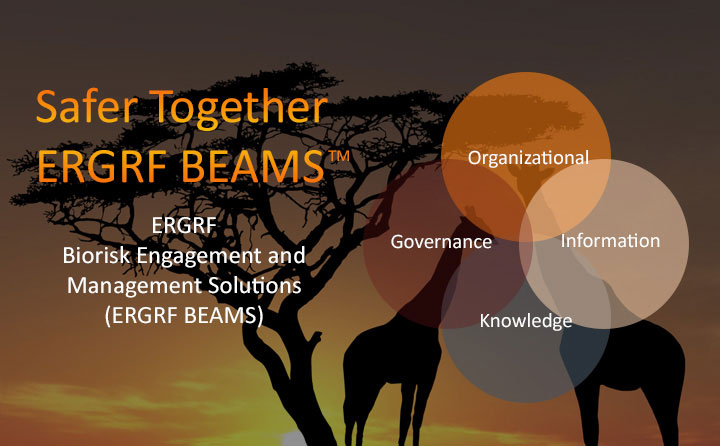In working with a number of unique research communities, we next found ourselves involved with the rapidly growing number of high containment research facilities and other facilities working in the areas of emerging infectious diseases amongst humans and animals, biodefense programs, and clinical laboratories. Again, because we are relatively unhindered by bureaucracy, our ability to mobilize resources and establish points-of-contacts within the research community often proved invaluable.
Biorisk Engagement and Management Solutions Team (BEAMS)

Prevent. Detect. Respond. The Elizabeth R. Griffin Research Foundation is committed to the vision of the Global Health Security Agenda to make the world safe and secure from global health threats posed by infectious diseases. To meet this commitment, ERGRF BEAMS develops programs that are innovative, effective and efficient. Each core program developed is purposefully designed to be adaptive and reproducible across multiple geographic locations. ERGRF BEAMS professionals have experience in all areas of biosafety both human health and animal health and are recognized internationally for the expertise in Biorisk Management. They utilize an engaging approach to work with local champions in seeking solutions that are local, practical and sustainable. Our programs are designed to demonstrate effectiveness both to the recipients and the global donor community.
We strongly support initiatives that seek to improve health and safety for human and animal populations without regard to geography, politics or culture.
ERGRF fundamentally holds that all practitioners, facilities, organizations and ministriesengaged in the handling of biological agents have a duty of care to themselves and to others. Using Biorisk Management philosophies and strategies to measure and mitigate risks, we believe that programs must seek, develop and deliver biorisk management strategies that address five critical issues following the Plan-Do-Check-Act (PDCA) pathway for quality programs. The five critical issues are:
- 1. Accuracy of information - Plan
- 2. Ability to respond responsibly and securely - Do
- 3. Reasonableness of solution for the environment where applied - Plan-Check-Act
- 4. Likelihood of sustainability - Plan-Act
- 5. Assessment of effectiveness - Check-Act
Where ERGRF Works
Interactive map coming soon!
